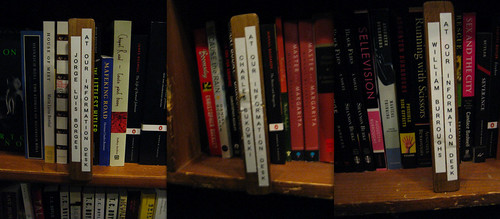A few years ago, I noticed a bunch of books sitting behind the information desk at the St. Mark’s Bookshop in the East Village. The books were multiple copies of Don Delillio, Paul Auster, and Raymond Carver. I asked the sale clerk behind the counter what they were doing there. As it turns out, independent book shops put certain authors behind the counter to keep them from leaving the store before they have been purchased. If you go into the stacks of St. Mark’s, you’ll find signs within the titles, directly customers to the information desks. The other authors also include Jorge Luis Borges, William Burroughs, Jack Kerouac, and Hubert Selby. A bit further south in Nolita, McNally Jackson Books uses a similar strategy. Charles Bukowski makes an appearance, with Delillo and Burroughs giving a repeat showing. These choice titles are not the current best sellers, but are works from those aggressive writers who capture college-aged (give or take a few years) minds. Those books, like White Noise or Junkie, feel dangerous the first time they are read. In a way, it makes sense that that those book are the ones most often stolen.
Somewhere there is this whole small oddity, there resides in compliment making it for behind the counter.
Other people who write about books:
Future of the Book
The Penguin Blog
26th Story
Planned Obsolescence
New York Public Library Blog





Borges might not think the book thieves too big a deal:
“[Some] believed that it was fundamental to eliminate useless works. They invaded the hexagons, showed credentials which were not always false, leafed through a volume with displeasure and condemned whole shelves: their hygienic, ascetic furor caused the senseless perdition of millions of books.”
“Their name is execrated, but those who deplore the “treasures” destroyed by this frenzy neglect two notable facts. One: the Library is so enormous that any reduction of human origin is infinitesimal. The other: every copy is unique, irreplaceable, but (since the Library is total) there are always several hundred thousand imperfect facsimiles: works which differ only in a letter or a comma.”
at
http://jubal.westnet.com/hyperdiscordia/library_of_babel.html
I’m pretty sure this is codified as policy at Barnes & Nobles nationwide? I feel like I saw a list of these books somewhere and remember it as being kind of arbitrary. Oh, here’s an excerpt from an old On the Media:
BROOKE GLADSTONE: Ron Rosenbaum is the author of a collection of non-fiction called The Secret Parts of Fortune. He got the Barnes & Noble clerk to share the list of the most shoplifted. Barnes & Noble declined to answer our questions, so consider the following privileged information.
RON ROSENBAUM: Here’s the authors they gave me. Martin Amis, Paul Auster, George Bataille, William Burroughs, Italo Calvino, Raymond Chandler, Michel Foucault, Dashiell Hammett, Jack Kerouac and Jeanette Winterson.
BROOKE GLADSTONE: On both coasts and points in between, Bukowski is the number-one choice of book bandits. And Rosenbaum has formed a personality profile of the perpetrators.
( http://www.onthemedia.org/transcripts/2005/12/23/08 ). The beats I kind of understand, though that seems kind of dated. Foucault? Are people really stealing Foucault?
Great comments Frank and Dan.
And that is a fantastic “On the Media” piece.
I love that B&N has their own most wanted list that they keep behind the counter, even if they have guards and theft detectors.
Having Foucault on the list makes me super happy. I think it rightly points out that there are different reasons why someone would steal a book from the romantic to the practical. To the point of the practical, at the heights of the Harry Potter popularity, the series could be found behind the counter at St. Marks with Delillio and Auster.